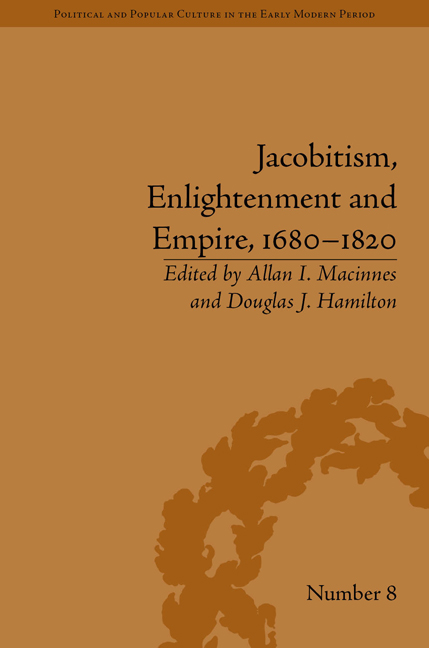Book contents
- Frontmatter
- CONTENTS
- List of Contributors
- List of Tables
- Introduction: Identity, Mobility and Competing Patriotisms
- 1 Jamie the Soldier and the Jacobite Military Threat, 1706–27
- 2 Simply a Jacobite Heroine? The Life Experience of Margaret, Lady Nairne (1673–1747)
- 3 Missionaries or Soldiers for the Jacobite Cause? The Conflict of Loyalties for Scottish Catholic Clergy
- 4 English Liturgy and Scottish Identity: The Case of James Greenshields
- 5 ‘Let Him be an Englishman’: Irish and Scottish Clergy in the Caribbean Church of England, 1610–1720
- 6 Scotland, the Dutch Republic and the Union: Commerce and Cosmopolitanism
- 7 Clearing the Smokescreen of Early Scottish Mercantile Identity: From Leeward Sugar Plantations to Scottish Country Estates c. 1680–1730
- 8 Union, Empire and Global Adventuring with a Jacobite Twist
- 9 John Drummond of Quarrel: East India Patronage and Jacobite Assimilation, 1720–80
- 10 William Playfair (1759–1823), Scottish Enlightenment from Below?
- 11 The Visionary Voyages of Robert Burns
- 12 ‘Defending the Colonies against Malicious Attacks of Philanthropy’: Scottish Campaigns against the Abolitions of the Slave Trade and Slavery
- Abbreviations
- Notes
- Index
Introduction: Identity, Mobility and Competing Patriotisms
- Frontmatter
- CONTENTS
- List of Contributors
- List of Tables
- Introduction: Identity, Mobility and Competing Patriotisms
- 1 Jamie the Soldier and the Jacobite Military Threat, 1706–27
- 2 Simply a Jacobite Heroine? The Life Experience of Margaret, Lady Nairne (1673–1747)
- 3 Missionaries or Soldiers for the Jacobite Cause? The Conflict of Loyalties for Scottish Catholic Clergy
- 4 English Liturgy and Scottish Identity: The Case of James Greenshields
- 5 ‘Let Him be an Englishman’: Irish and Scottish Clergy in the Caribbean Church of England, 1610–1720
- 6 Scotland, the Dutch Republic and the Union: Commerce and Cosmopolitanism
- 7 Clearing the Smokescreen of Early Scottish Mercantile Identity: From Leeward Sugar Plantations to Scottish Country Estates c. 1680–1730
- 8 Union, Empire and Global Adventuring with a Jacobite Twist
- 9 John Drummond of Quarrel: East India Patronage and Jacobite Assimilation, 1720–80
- 10 William Playfair (1759–1823), Scottish Enlightenment from Below?
- 11 The Visionary Voyages of Robert Burns
- 12 ‘Defending the Colonies against Malicious Attacks of Philanthropy’: Scottish Campaigns against the Abolitions of the Slave Trade and Slavery
- Abbreviations
- Notes
- Index
Summary
Global adventuring became a way of life for Scots in the seventeenth century. In the wake of the Treaty of Union, which incorporated Scotland and England from 1707, the traditional continental sojourning of Scots as soldiers and scholars was pressed into service of the inchoate yet expanding eighteenth-century British Empire. Scots became prominent in the British Army and Royal Navy. They also served with distinction on religious missions and in academic institutions that brought together enterprise and enlightenment. Enterprise, if not enlightenment, was a key feature of Scottish engagement in the tobacco and sugar trades from the Americas, in the tea, coffee and silk trades from Asia and in the slave trade from Africa. In the process, the high incidence and extent of Scottish mobility fostered identities that can readily be depicted as multi-polar or multi-faceted. To be understood, these identities must be weighted with respect to time and space and by the ways they were given particular focus by competing Scottish and British patriotisms originating in the internecine rivalry of Jacobites and Whigs, which was confessional and territorial as well as factional and political.
Scottish Jacobites sought the restoration of the house of Stuart exiled at the far from ‘glorious’ Revolution, the sundering of the Treaty of Union and the removal of the Presbyterian establishment in the Kirk that had been accomplished in 1689–90 and reaffirmed in 1707. British Whigs upheld the Revolution, the Union and, from 1714, the succession of the house of Hanover as monarchs.
- Type
- Chapter
- Information
- Jacobitism, Enlightenment and Empire, 1680–1820 , pp. 1 - 12Publisher: Pickering & ChattoFirst published in: 2014

